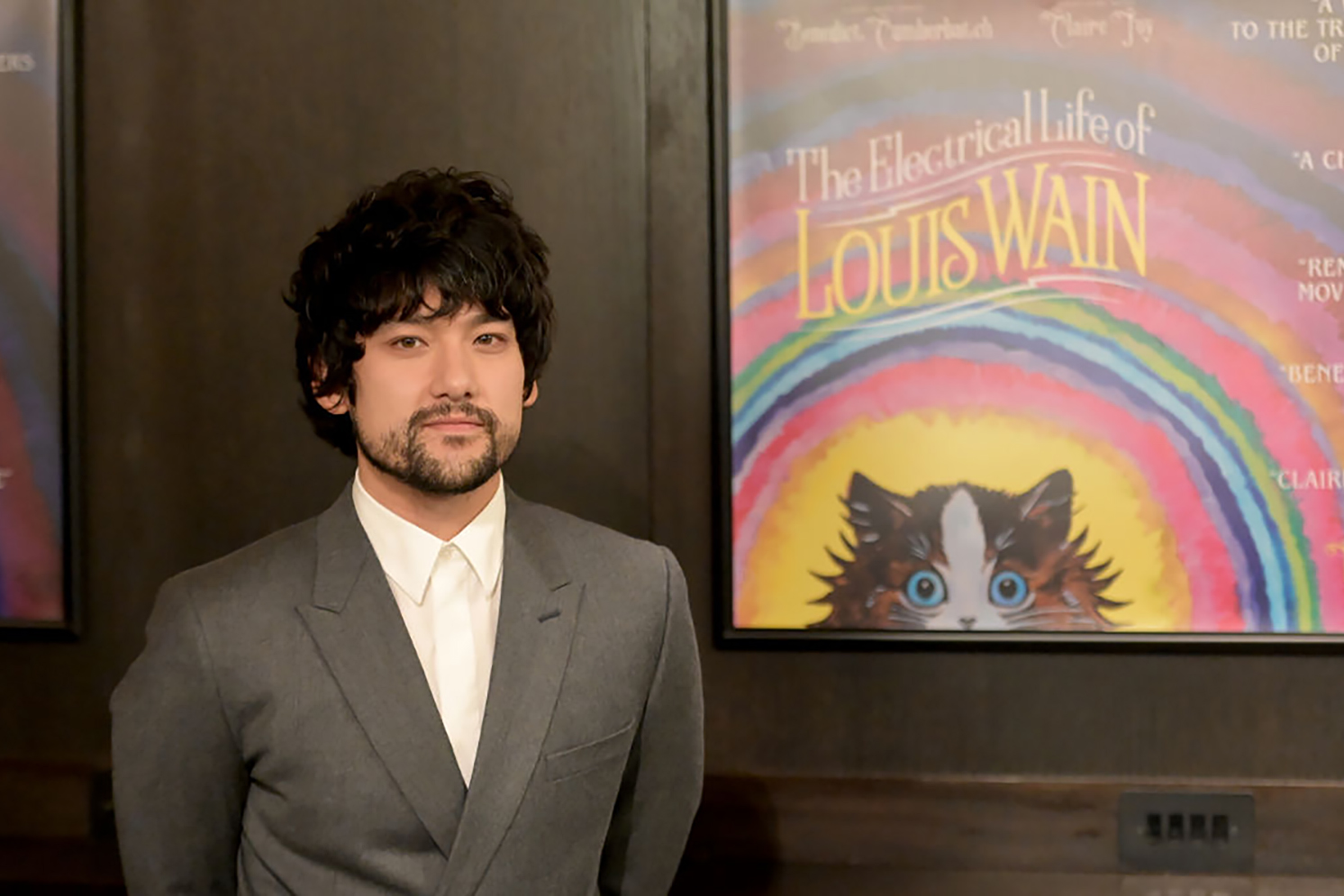
- Film
Will Sharpe on Cats, Chemistry, and Cumberbatch in “The Electrical Life of Louis Wain”
Thought-provoking themes of mental anxiety, mourning and manipulation all stir to the surface in the biographical feature The Electrical Life of Louis Wain. The movie’s story follows the life of the eccentric English artist and illustrator Louis Wain, played by three-time Golden Globe nominee Benedict Cumberbatch. Wain’s whimsical drawings of anthropomorphized cats rose to prominence on the art scene of London in the late 1800s, so it’s fitting that the film set was often filled with feline inspiration.
Animals can be incredibly unpredictable, but the movie’s director and co-writer Will Sharpe was adamant that the team use real creatures in front of the cameras. “I didn’t want to use CG to manipulate the cats’ behavior,” he explains at a Film Independent online screening event sponsored by the HFPA. “Going into this project, I was very clear that I felt this was a human story about a human being, and I wanted the audience to connect with Louis Wain. I wanted the audience to understand him as a human, almost more than as an artist or as a historical figure, and I felt that having CG cats would perhaps push it towards a more fantasy realm.”
How did that play out on the English set of the production? “What that meant was that we were working with very accomplished cat wranglers and very accomplished cat actors,” continues the English-Japanese filmmaker. “Often, they would surprise and delight us by doing exactly what we needed, or by doing something even better. But at other times they would do whatever they wanted to do because they are cats and that doesn’t change on a film set.”
A dramatic love story permeates through The Electrical Life of Louis Wain, but it was happenstance that the chemistry between the two romantic leads – played by Cumberbatch and Golden Globe winner Claire Foy – was instantaneous. “It was immediately apparent in our rehearsals,” remarks Sharpe. “And it probably affected how I shot some of their scenes together, because I really wanted them to share the frame as much as possible. I wanted to fill that 4:3 image with their faces. Of course, there’s a degree of post-production editing and manipulation of the material involved in a film, but I do feel like there is a really big live aspect to the process of filmmaking.”
There’s a wistful pause before he continues: “Sometimes I feel like the director’s job alongside his cast and crew is to try and create an environment in which people feel safe enough to be open and vulnerable, and to let a remarkable event happen. There were a few times during the filming of this where I’d be huddled under a piece of black cloth in the corner of a kitchen and I felt like there was a real, actual remarkable moment taking place; particularly between Benedict and Claire, but also with Benedict on his own.”
The Electrical Life of Louis Wain was brought to Sharpe by Cumberbatch’s production company SunnyMarch. “I guess there are some projects that you find yourself thinking about all the time; they suck you into their orbit,” reveals Sharpe. “This was definitely one of those projects. Like many of you, the pictures of Louis Wain felt familiar to me. I felt certain that I’d seen them somewhere, but I hadn’t heard of his name and I didn’t know anything about his life story. However, I immediately felt taken with this work.”
Speaking about Wain’s playful and sometimes psychedelic art, Sharpe continues: “I thought it was interesting how there were these very innocent, playful tableaux of cats. Often, they’d be doing very human things like playing badminton or gambling, but occasionally you’d see a little inscription or a detail that portrayed an underlying fragility or anxiety of some kind. The more I read about Louis, the more I found him to be an incredibly inspiring figure. I guess I found it to be a heroic figure, because he had led a genuinely remarkable life. I really wanted to understand him and I wanted to help the audience understand him as well.”
When the project came to Sharpe, Cumberbatch was acting on screen in the Showtime drama Patrick Melrose. Not only did the TV role garner the Sherlock star a Golden Globe nomination, but it also won over the potential director. “I felt like it was a very human and virtuosic performance, so I was very excited to collaborate with Benedict,” admits Sharpe. “As soon as we started talking about the project, I felt like we were on the same page. We both wanted to tell a really empathetic version of the story. Wain was often misunderstood during his own lifetime, so we wanted to get under his skin and into his heart, and into his mind to open it out to a wider audience.”
Sharpe is also an actor who most recently appeared on screen in the Netflix thriller Giri/Haji. Before the candid conversation comes to a close, the subject matter turns to Golden Globe winner Olivia Colman, who serves as the film’s narrator. Elaborating on his casting choice, Sharpe concludes: “I wanted somebody who would be able to carry that slightly ironic, objective detachment for comedic purposes. I also wanted somebody who could bring the warmth and the tenderness when the story calls for that, too. I know that Olivia is able to tread that line with absolute precision. I also felt like she fit the bill of somebody who feels like they belong in a period drama, but also has a modern edge. There’s something about her that is a little bit wry, as well as a little bit cheeky and dangerous.”

